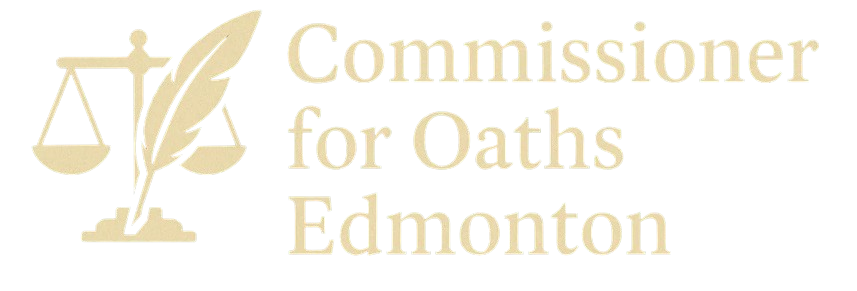Find Commissioner for Oaths Edmonton
Need Commissioner of Oaths services in Edmonton but unsure where to start? You’re not alone. Many Edmonton residents require official document authentication for affidavits, statutory declarations, immigration paperwork, real estate transactions, or court documents. Finding a qualified commissioner is crucial to ensure your paperwork is legally valid. This guide simplifies the process, explaining what commissioners do, when you need one, how to find one in Edmonton, and what to expect during your appointment.
What Does a Commissioner of Oaths Do?
A Commissioner of Oaths is an essential figure in Alberta’s legal system, ensuring document integrity for various legal processes.
Definition and Legal Authority
In Alberta, a Commissioner of Oaths is authorized to administer oaths, affirmations, and statutory declarations, as well as witness the signing of legal documents. They verify the signer’s identity, ensure they understand the document’s content, and confirm the document is signed voluntarily. Operating under Alberta’s legal framework, commissioners carry significant responsibility, as falsely representing an affidavit or declaration can lead to severe penalties.
Key Differences from a Notary Public
While Commissioners of Oaths and Notaries Public share some functions, their roles differ:
- Limited Jurisdiction: Commissioners can only administer oaths for documents used within Alberta, while notaries often handle international documents.
- Document Certification: Commissioners cannot certify copies of original documents as true; this is a notary’s role.
- Authority Scope: Commissioners cannot witness deeds, contracts, or commercial instruments, nor issue certificates under specific acts.
- Appointment Process: Becoming a notary is generally more rigorous than becoming a commissioner.
If your documents require certification for use outside Alberta or as true copies, you’ll need a Notary Public.
Common Misconceptions
Many misunderstand the role of a Commissioner of Oaths. They do not “approve” documents or verify their truthfulness; they only ensure proper procedures are followed. Commissioners are also prohibited from offering legal advice—consult a lawyer for that. Additionally, they cannot officiate weddings, as they are not Marriage Commissioners. Their role is administrative, confirming that oaths or affirmations are properly administered, not validating the document’s content.
When and Why You Might Need a Commissioner
Official document authentication is required more often than you might think. Knowing when a Commissioner of Oaths is needed can save time and prevent legal issues.
Legal Documents Requiring a Commissioner
Documents that typically need a Commissioner’s signature include:
- Affidavits: Written statements sworn or affirmed for court proceedings.
- Statutory Declarations: Used when no specific legislation authorizes an affidavit.
- Land Title Transfers: Documents for property ownership changes.
- Name Change Applications: Required for legal name changes.
- Corporate Documents: Business filings needing official verification.
Any document with phrases like “I solemnly swear” or “I make this solemn declaration” usually requires a Commissioner’s stamp.
Common Situations
Commissioners are often needed for:
- Immigration Matters: Letters of invitation, travel consent documents, or sworn affidavits.
- Real Estate Transactions: Mortgage affidavits, land title transfers, or lease agreements.
- Court Proceedings: Affidavits for legal cases.
- Other Needs: Passport declarations, consent letters for children traveling abroad, common-law union declarations, or professional license applications.
Who Uses These Services?
A wide range of people rely on Commissioners, including:
- Newcomers: For immigration-related documents.
- Professionals: Accountants, real estate agents, or business owners needing licensing or corporate filings.
- Individuals: For estate matters, name changes, insurance claims, or travel consent letters.
Commissioners verify that the signer swears or affirms the document’s accuracy, not the truth of its contents.
How to Find a Commissioner of Oaths in Edmonton
Finding a Commissioner in Edmonton is straightforward with the right resources.
Where to Look
- Law Offices: Many, like Kahane Law Office, offer commissioner services by appointment or walk-in, with short wait times.
- Registry Agents: Authorized by the Government of Alberta to provide commissioner services.
- Mobile Services: Providers like Jevanas and Edmonton Fingerprinting offer 24/7 or doorstep services for convenience.
Checking Credentials
Ensure your commissioner is legitimate by verifying they are appointed by Alberta’s Ministry of Justice and Solicitor General. Commissioners must be at least 18, reside in Alberta, and have no criminal record. Bring government-issued photo ID and unsigned documents to your appointment.
Cost and Availability
Costs vary, starting at around $20 for basic services and $35 or more for others. Many providers offer same-day appointments or walk-in options. Mobile services cater to urgent or after-hours needs, and some, like NotaryPro, provide online booking for convenience. For documents used outside Alberta, seek a Notary Public instead.
Step-by-Step: Using a Commissioner of Oaths
Working with a Commissioner involves five clear steps.
Step 1: Prepare Your Documents
Complete all paperwork but leave signature fields blank, as you must sign in the commissioner’s presence. Statutory declarations should follow the prescribed format.
Step 2: Bring Valid ID
Bring a government-issued photo ID, such as a driver’s license or passport. Some providers may require two forms of ID.
Step 3: Understand Your Statement
Ensure you fully understand your document’s contents, as you’re legally responsible for them. Commissioners may ask if you comprehend what you’re signing.
Step 4: Swear or Affirm in Person
Choose between an oath (religious) or affirmation (non-religious). Both are legally equivalent. The commissioner will ask you to confirm the truth of your document’s contents, to which you respond, “I do.”
Step 5: Get Your Document Signed and Stamped
The commissioner signs and stamps the document with a “jurat,” including their name, title, and date, making it legally valid in Alberta. This process must occur in person.
What to Expect During the Appointment
Commissioner appointments are straightforward but legally significant.
How Identity Is Verified
Commissioners verify your identity using government-issued photo ID. If they know you personally, this step may be skipped.
Questions You May Be Asked
Expect questions like:
- Are you the person named in the document?
- Is this your signature (or will you sign in their presence)?
- Do you understand the document’s contents?
- Are you signing voluntarily?
These ensure the process is legitimate and you’re informed.
How Long It Takes
Most appointments take 5-10 minutes for standard documents. Complex documents or language barriers may extend this time.
Conclusion
Navigating Commissioner of Oaths services in Edmonton is simple with the right knowledge. Commissioners play a vital role in authenticating documents for legal processes like immigration, real estate, or court proceedings. Understanding their role, limitations, and the difference between commissioners and notaries helps you choose the right service.
The five-step process—preparing documents, bringing ID, understanding your statement, swearing or affirming, and getting the document stamped—ensures a smooth appointment, typically lasting just 5-10 minutes. Edmonton offers flexible options, including law offices, registry agents, and mobile services, with costs starting at $20.
By following this guide, you can confidently handle your legal document needs, ensuring compliance without stress. Keep this information handy for future reference, as document authentication needs can arise unexpectedly.

